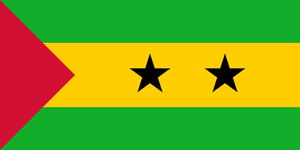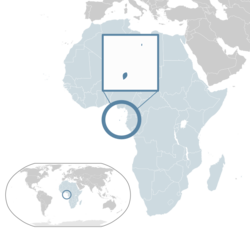São Tomé and Príncipe
(Archipelago) | |
|---|---|
 The flag of São Tomé and Príncipe | |
 | |
| Location | Africa |
| Leader | São Tomé and Príncipe/President |
| Type | |
| Member of | African Union, La Francophonie, Organisation of African Unity, UN |
| Subpage | •São Tomé and Príncipe/President |
| A Portuguese-speaking island nation in the Gulf of Guinea. | |
São Tomé and Príncipe is an island nation off the west coast of Africa. It consists of two archipelagos around the two main islands of São Tomé and Príncipe, about 140 km apart and about 250 and 225 km off the northwestern coast of Gabon. With a population of 201,800 (2018 official estimate),[1] São Tomé and Príncipe is the second-smallest and second-least populous African sovereign state after Seychelles as well as the smallest and least populous Portuguese-speaking country.
Contents
History
The country's name in English means Saint Thomas and Prince. It peacefully gained independence from Portugal on 12 July 1975, and has been relatively stable since then.
Influence
Held a non-permanent seat on the United Nations Security Council from 2020 to 2021.
Voice of America
In 2002, the US had plans to establish a small military base on the island of São Tomé. São Tomé and Príncipe accepted the construction of the base, but the plan was canceled due to US political and financial issues. In 1992, the US federal government broadcaster, Voice of America, and the government of São Tomé signed a long-term agreement to establish a relay broadcasting station in São Tomé. Voice of America currently broadcasts to much of Africa from this facility.[2]
A citizen of São Tomé and Príncipe on Wikispooks
| Title | Born | Description |
|---|---|---|
| Carlos Vila Nova | 27 July 1959 | New president of São Tomé and Príncipe. |
References
- ↑ Instituto Nacional de Estadística de São Tomé e Príncipe, as at 13 May 2018.
- ↑ https://www.cia.gov/the-world-factbook/countries/sao-tome-and-principe/